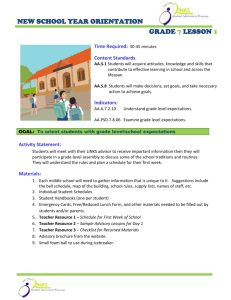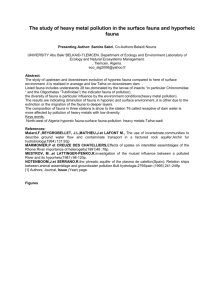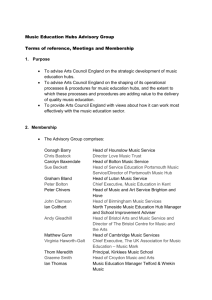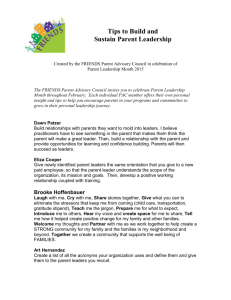Frequently Asked Questions Advisory List for Threatened Vertebrate
advertisement
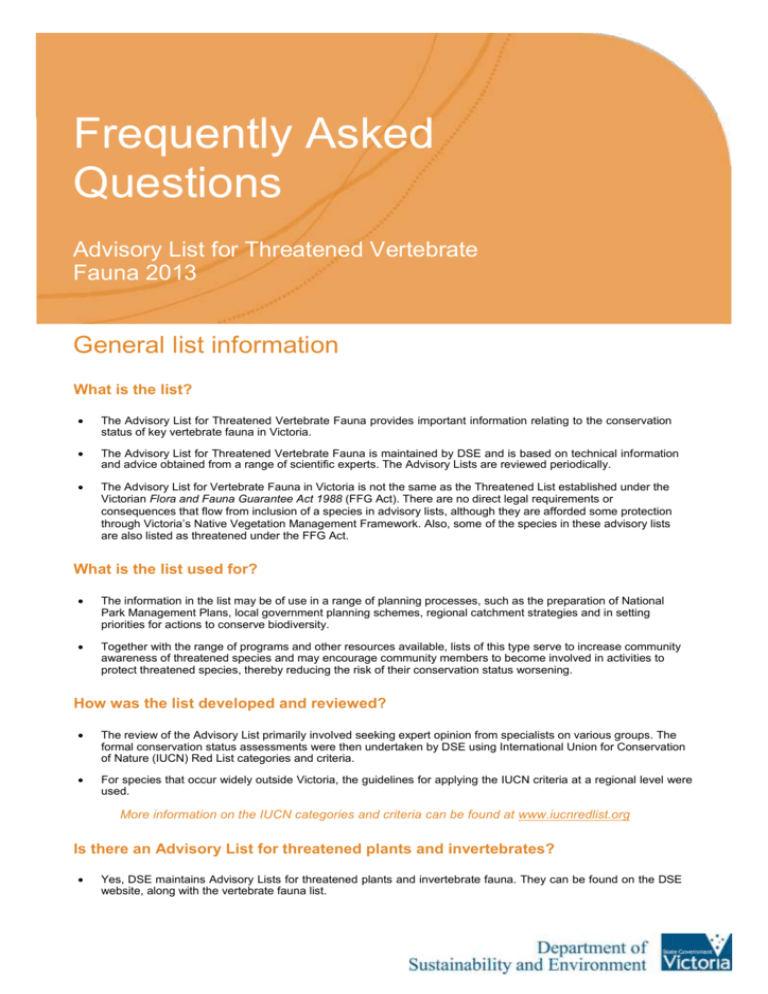
Frequently Asked Questions Advisory List for Threatened Vertebrate Fauna 2013 General list information What is the list? The Advisory List for Threatened Vertebrate Fauna provides important information relating to the conservation status of key vertebrate fauna in Victoria. The Advisory List for Threatened Vertebrate Fauna is maintained by DSE and is based on technical information and advice obtained from a range of scientific experts. The Advisory Lists are reviewed periodically. The Advisory List for Vertebrate Fauna in Victoria is not the same as the Threatened List established under the Victorian Flora and Fauna Guarantee Act 1988 (FFG Act). There are no direct legal requirements or consequences that flow from inclusion of a species in advisory lists, although they are afforded some protection through Victoria’s Native Vegetation Management Framework. Also, some of the species in these advisory lists are also listed as threatened under the FFG Act. What is the list used for? The information in the list may be of use in a range of planning processes, such as the preparation of National Park Management Plans, local government planning schemes, regional catchment strategies and in setting priorities for actions to conserve biodiversity. Together with the range of programs and other resources available, lists of this type serve to increase community awareness of threatened species and may encourage community members to become involved in activities to protect threatened species, thereby reducing the risk of their conservation status worsening. How was the list developed and reviewed? The review of the Advisory List primarily involved seeking expert opinion from specialists on various groups. The formal conservation status assessments were then undertaken by DSE using International Union for Conservation of Nature (IUCN) Red List categories and criteria. For species that occur widely outside Victoria, the guidelines for applying the IUCN criteria at a regional level were used. More information on the IUCN categories and criteria can be found at www.iucnredlist.org Is there an Advisory List for threatened plants and invertebrates? Yes, DSE maintains Advisory Lists for threatened plants and invertebrate fauna. They can be found on the DSE website, along with the vertebrate fauna list. Frequently Asked Questions - Advisory List for Vertebrate Fauna 2013 The update Some species on the previous Advisory List are not on the 2013 list, why? To inform the 2013 Vertebrate Fauna Advisory List species on the 2007 List were reassessed against the IUCN Red List categories and criteria using the most recent scientific information available. Species that were listed on previous versions of the Advisory List and are not found on the 2013 version no longer meet the criteria for listing. For example: Population numbers have stabilised and are no longer showing decline. Research has found the species to be more common and widely distributed than originally thought. New information suggests that what were initially thought to be multiple species are now found to be part of the one species. There are new species on the list, why? Victorian vertebrate fauna have been assessed against the IUCN Red List categories and criteria using the most up to date scientific information available. Species that are new to the list have met the criteria for listing according to the panel of experts. For example: Population numbers are declining rapidly and the species in only found in a small number of localised areas. New information suggests that what was initially thought to be one species is now found to be multiple species. Some items have undergone nomenclature (name) changes, why? Some species have undergone a nomenclature (name) change. Nomenclature changes are linked to new scientific information being discovered about that species. For example: The species is no longer considered part of the genus it was originally thought to be. Published by the Victorian Government Department of Sustainability and Environment Melbourne, March 2013. © The State of Victoria Department of Sustainability and Environment 2013 This publication is copyright. No part may be reproduced by any process except in accordance with the provisions of the Copyright Act 1968. Authorised by the Victorian Government, 8 Nicholson Street, East Melbourne. Print managed by Finsbury Green. Printed on recycled paper. or is wholly appropriate for your particular purposes and therefore disclaims all liability for any error, loss or other consequence which may arise from you relying on any information in this publication. Accessibility If you would like to receive this publication in an accessible format, such as large print or audio, please telephone 136 186, or email customer.service@dse.vic.gov.au For more information contact the DSE Customer Service Centre 136 186 Deaf, hearing impaired or speech impaired? Call us via the National Relay Service on 133 677 or visit www.relayservice.com.au Disclaimer This document is also available in PDF format on the internet at www.dse.vic.gov.au ISBN 978-1-74287-504-0 (online) This publication may be of assistance to you but the State of Victoria and its employees do not guarantee that the publication is without flaw of any kind


